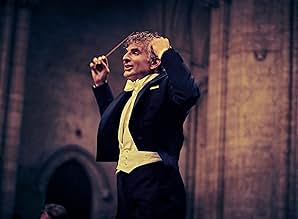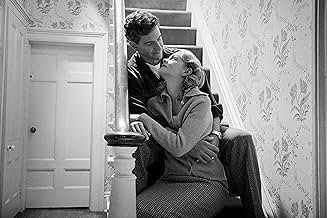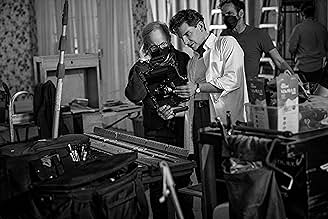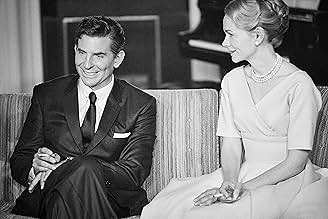लियोनार्ड और फ़ेलिशिया का जटिल प्रेम, 1946 में एक पार्टी में मिलने के समय से और दो सगाई, 25 साल की शादी और तीन बच्चों के माध्यम से जारी रहा.लियोनार्ड और फ़ेलिशिया का जटिल प्रेम, 1946 में एक पार्टी में मिलने के समय से और दो सगाई, 25 साल की शादी और तीन बच्चों के माध्यम से जारी रहा.लियोनार्ड और फ़ेलिशिया का जटिल प्रेम, 1946 में एक पार्टी में मिलने के समय से और दो सगाई, 25 साल की शादी और तीन बच्चों के माध्यम से जारी रहा.
- 7 ऑस्कर के लिए नामांकित
- 27 जीत और कुल 180 नामांकन
फ़ीचर्ड समीक्षाएं
The acting is superb and particularly Carey Mulligan who is astonishing, as usual, and Bradley Cooper's transformation is incredible. The look and feel throughout is very polished. But, and this isn't a minor quibble -- I found it really hard to understand the dialogue! Characters speak so quickly, in a mumble, that I actually considered putting on subtitles. Anyway, it wouldn't have made a difference, I thought the movie was so empty and plotless and uninteresting. There was really no tension in the wife's dealing with her husband's bisexuality, no real exploration or understanding of Bernstein's conflicts, and no delving into his achievements or their context, so there wasn't much left!
We don't know much about Leonard Bernstein. We didn't learn why he wanted to be a composer or how he got in the business. His relationship wasn't very clear either. He's bisexual, but that doesn't go anywhere. His wife isn't explained much either other than being a stage actress. We don't know much about his children. The timelines aren't clear when the movie takes place. It seems to start in the 50s other than the opening scene of him as an old man. I do like Bradley Cooper's performance, but not much comes from the character. We don't know what made him famous since he was already famous before his memorable score in On the Waterfront.
A struggling musician agonized by his own genius, talents, and creativity and trapped in loveless marriage filled with guilt. Both look the other way while one has an affair and realize the importance of one's own partner too late. Right now, at the top of my head I can think of 'Fosse/Verdon', 'A Star Is Born', 'George & Tammy', 'Walk the Line', 'Dreamgirls', 'Daisy Jones & The Six', and etc. (Wow, that's a lot.) Biographical genre is especially tricky because it has to excel the life of actual historical figures. 'Maestro' could have been so much better if it delved into the introspective and artistic side of Bernstein deeper or provided a different and fresh point of view on his life rather than reciting his personal life. His autobiography or research would be more fun and interesting than this explanatory movie.
There were a few futile attempts to make the movie look more artistic, abstract, and ambiguous. They failed because they serve no purpose but to look pretentious. White and black, camera movement, the use of light and shadows, and musical aspects. They are all good attempts, but for what? By doing so, is the story getting stronger? Do they enhance what viewers feel? Waste of time and films.
Bradley Cooper's performance is disappointing. He never acts; he imitates. When he's on the screen, we know clearly that he's acting. It's hard to be absorbed and immersed into the screen because he always pushes the audience away with his trying too hard. I get that he wants to emulate Bernstein's twangy voice. However, emotions and messages he delivers are more important than his likeness of Bernstein's tone, accent, sound, or mannerism. He focuses on what's outside of Bernstein rather than what would be inside of him. There is a 10 minute sequence of Cooper conducting, and it's screaming 'Look how good I am!!!'. It's one of the highest points for emotions to burst out for the audience, and I started to laugh.
There were a few futile attempts to make the movie look more artistic, abstract, and ambiguous. They failed because they serve no purpose but to look pretentious. White and black, camera movement, the use of light and shadows, and musical aspects. They are all good attempts, but for what? By doing so, is the story getting stronger? Do they enhance what viewers feel? Waste of time and films.
Bradley Cooper's performance is disappointing. He never acts; he imitates. When he's on the screen, we know clearly that he's acting. It's hard to be absorbed and immersed into the screen because he always pushes the audience away with his trying too hard. I get that he wants to emulate Bernstein's twangy voice. However, emotions and messages he delivers are more important than his likeness of Bernstein's tone, accent, sound, or mannerism. He focuses on what's outside of Bernstein rather than what would be inside of him. There is a 10 minute sequence of Cooper conducting, and it's screaming 'Look how good I am!!!'. It's one of the highest points for emotions to burst out for the audience, and I started to laugh.
Maestro (2023) seems a very flimsy "biography" of Leonard Bernstein. We learn just about nothing of his life. Music. Wife. Boys on the side. Other than that?
The film stars Bradley Cooper and a fake nose. He (Cooper, not the nose) also co-wrote, directed, and produced and is being hailed for his work and artistic ambition. Coincidentally, I'm reading Barbra Streisand's new 970-page memoir and in her section on Yentl, she recalls the reviews that lambasted her colossal ego to star in a film she also co-wrote, directed, and produced.
Anyway, I found Cooper's performance to be hysterically hammy (yes, I know Bernstein was flamboyant) and Mulligan's wife just plain annoying. Such self-centered people who were always "on." They were exhausting to watch ... but that's the whole film. There's no background material, Just them swanning about like characters out of Auntie Mame screaming "I was never in the chorus!"
This will likely reap a slew of Oscar nominations and Cooper will probably beat of DiCaprio and Cillian Murphy for best actor. Wry. Hold the ham!
The film stars Bradley Cooper and a fake nose. He (Cooper, not the nose) also co-wrote, directed, and produced and is being hailed for his work and artistic ambition. Coincidentally, I'm reading Barbra Streisand's new 970-page memoir and in her section on Yentl, she recalls the reviews that lambasted her colossal ego to star in a film she also co-wrote, directed, and produced.
Anyway, I found Cooper's performance to be hysterically hammy (yes, I know Bernstein was flamboyant) and Mulligan's wife just plain annoying. Such self-centered people who were always "on." They were exhausting to watch ... but that's the whole film. There's no background material, Just them swanning about like characters out of Auntie Mame screaming "I was never in the chorus!"
This will likely reap a slew of Oscar nominations and Cooper will probably beat of DiCaprio and Cillian Murphy for best actor. Wry. Hold the ham!
Think of a biopic of a famous person as like a complex cake - you can carefully dissect one slice of it to examine the contents, or you can bravely try to examine the whole lot to see what it's made of.
This biopic of American composer and conductor Leonard Bernstein is like looking at only the surface of the cake through a slice of Swiss cheese - a lot of loosely connected vignettes with no depth. If you don't know much about the man, you would leave the theatre with no great insights about him.
The film jumps around in time and gives you snippets of the man's life and work. There are scenes about his bisexuality and penchant for men, his role as a conductor and composer, his drug addictions and his relationship with his daughter, but none of these are examined in any depth at all. His bipolar relationship with his wife and her later death from cancer are given the most screen time, but still feels unfulfilled and lacking in substance.
Bradley Cooper directs in a rather disjointed style. The first half is shot in black and white, then we change to colour for no good reason except maybe historical chronology - it doesn't work. Neither does the curiously tight aspect ratio, which again inexplicably opens up to full screen near the end. Some scenes are beautifully shot but too often Cooper relies on the slow zoom in and the very long takes, which don't always seem to match the scene. The film also could have ended perfectly with the penultimate scene, but inexplicably ruins the moment with one extra shot that completely fails to land.
Carey Mulligan is excellent as Bernstein's wife but Cooper as Bernstein doesn't quite work for me. He tends to overact, gives you little insight into the man himself, and the nasal voice starts to grate after a while - maybe it was inevitable with the prosthetic nose he was required to wear.
Even the grand concert scene in the cathedral, conducting his beloved Mahler, didn't quite generate the depth of feeling it could have - contrast this with the Tchaikovsky concert scene in the French-Russian film Le Concert, which takes emotion (actors and viewers) to a much higher level.
All in all this is not a bad movie, and to be fair it does engage the viewer a little more in the second half. But it tackles too many themes with a disturbing superficiality, giving very little substance to almost any. It could have been a lot better. No doubt however it will get lots of Oscar nominations, but then the Academy lost the plot years ago and succumbs to hype more than merit.
This biopic of American composer and conductor Leonard Bernstein is like looking at only the surface of the cake through a slice of Swiss cheese - a lot of loosely connected vignettes with no depth. If you don't know much about the man, you would leave the theatre with no great insights about him.
The film jumps around in time and gives you snippets of the man's life and work. There are scenes about his bisexuality and penchant for men, his role as a conductor and composer, his drug addictions and his relationship with his daughter, but none of these are examined in any depth at all. His bipolar relationship with his wife and her later death from cancer are given the most screen time, but still feels unfulfilled and lacking in substance.
Bradley Cooper directs in a rather disjointed style. The first half is shot in black and white, then we change to colour for no good reason except maybe historical chronology - it doesn't work. Neither does the curiously tight aspect ratio, which again inexplicably opens up to full screen near the end. Some scenes are beautifully shot but too often Cooper relies on the slow zoom in and the very long takes, which don't always seem to match the scene. The film also could have ended perfectly with the penultimate scene, but inexplicably ruins the moment with one extra shot that completely fails to land.
Carey Mulligan is excellent as Bernstein's wife but Cooper as Bernstein doesn't quite work for me. He tends to overact, gives you little insight into the man himself, and the nasal voice starts to grate after a while - maybe it was inevitable with the prosthetic nose he was required to wear.
Even the grand concert scene in the cathedral, conducting his beloved Mahler, didn't quite generate the depth of feeling it could have - contrast this with the Tchaikovsky concert scene in the French-Russian film Le Concert, which takes emotion (actors and viewers) to a much higher level.
All in all this is not a bad movie, and to be fair it does engage the viewer a little more in the second half. But it tackles too many themes with a disturbing superficiality, giving very little substance to almost any. It could have been a lot better. No doubt however it will get lots of Oscar nominations, but then the Academy lost the plot years ago and succumbs to hype more than merit.
क्या आपको पता है
- ट्रिवियाOf the scene in which Leonard Bernstein conducts the London Symphony Orchestra at the Ely Cathedral in 1976, Bradley Cooper said, "That scene I was so worried about because we did it live... I was recorded live. I had to conduct them. And I spent six years learning how to conduct six minutes and 21 seconds of music. I was able to get the raw take where I just watched Leonard Bernstein [conduct] at Ely Cathedral... And so I had that to study."
- गूफ़The day after Bernstein makes his wildly successful debut with the N.Y. Philharmonic in November of 1943, the story is carried on the front page of the N.Y. Times. One of his friends notes that the front page also includes a headline reading "Hitler Bombs Poland." Germany had bombed and conquered Poland in September, 1939, so the country had already been under German occupation for over four years at the time of Bernstein's debut concert.
- भाव
Leonard Bernstein: Summer sang in me a little while, it sings in me no more. Edna St. Vincent Millay.
Felicia Montealegre: If the summer doesn't sing in you, then nothing sings in you. And if nothing sings in you, then you can't make music.
- कनेक्शनFeatured in Chris Plante: The Right Squad: एपिसोड #1.70 (2023)
टॉप पसंद
रेटिंग देने के लिए साइन-इन करें और वैयक्तिकृत सुझावों के लिए वॉचलिस्ट करें
- How long is Maestro?Alexa द्वारा संचालित
विवरण
- रिलीज़ की तारीख़
- कंट्री ऑफ़ ओरिजिन
- आधिकारिक साइट
- भाषा
- इस रूप में भी जाना जाता है
- Rybernia
- फ़िल्माने की जगहें
- उत्पादन कंपनियां
- IMDbPro पर और कंपनी क्रेडिट देखें
बॉक्स ऑफ़िस
- बजट
- $8,00,00,000(अनुमानित)
- दुनिया भर में सकल
- $3,83,532
- चलने की अवधि
- 2 घं 9 मि(129 min)
- रंग
- ध्वनि मिश्रण
- पक्ष अनुपात
- 1.33 : 1
इस पेज में योगदान दें
किसी बदलाव का सुझाव दें या अनुपलब्ध कॉन्टेंट जोड़ें































